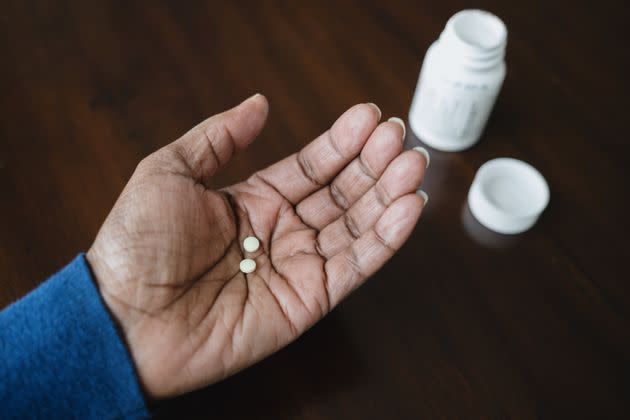So THAT'S The Difference Between Tylenol And Advil

If you’re in pain and you’re looking for relief in the form of an over-the-counter drug, you’ve got a slew of options.
There’s acetaminophen, or Tylenol. There’s ibuprofen, which is used in products including Advil and Motrin. There’s aspirin, which, like ibuprofen, is a nonsteroidal anti-inflammatory drug (NSAID), and there’s naproxen, used in Aleve, which is also an NSAID.
So what’s the difference between these products? And why might you reach for one over another when you’ve got a headache or some other pain?
That’s why we — Raj Punjabi and Noah Michelson, hosts of HuffPost’s “Am I Doing It Wrong?” podcast — asked Dr. Darryl Brown, a pain management and anesthesiology specialist at Mount Sinai Hospital in New York City when he stopped by our studio to chat about the best ways to manage pain.
Listen to the full episode by pressing play on the player:
“Over-the-counter medication works, and it should be our first line for pain that you experience at home,” Brown told us. “I like to break it down into two separate categories: There are medications that impact your perception of pain, and there are medications that actually treat the inflammation that’s causing your pain.”
Acetaminophen, or Tylenol, changes our perception of pain.
“It’s a very safe medication to take — you can even take it during pregnancy — but it’s not necessarily addressing the inflammation that leads to a lot of acute pain,” Brown said.
Doctors and scientists aren’t totally sure how acetaminophen works to tackle pain.
One “promising, yet still speculative, explanation” is that the drug might block the production of a particular enzyme in the brain, “thus blocking the further transmission of the pain nerve impulses.” That means the feeling of pain is dulled or eliminated, but the inflammation that may be causing the pain is not addressed.
“Non-steroidal anti-inflammatory drugs, or NSAIDs, like ibuprofen, and naproxen and Motrin, treat actual inflammation,” Brown explained. “So they’re blocking an enzyme to prevent any ongoing inflammation that you have and then treat your pain in that way.”
So if we have a headache, do we want to take acetaminophen or an NSAID?
“Great question. It depends on the source of your headache,” he said. “I would say starting with Tylenol is a great first-line therapy [because] it’s centrally acting. Headaches are generally a central process, because it involves your perception of pain, and it’s a very low risk medication to take [generally] without any side effects.”
If you’re experiencing a headache combined with muscle or skeletal pain or inflammation, an NSAID may be a better choice. There are also products that combine both types of medication, and for some people and conditions that might be a good option.
Of course, we also need to consider potential side effects, how often we’re using these medications and how much we’re taking. For instance, Tylenol taken at high doses can cause liver damage. Advil can cause an upset stomach and be dangerous for individuals with kidney disease or kidney failure, among other issues. That’s why consulting a medical professional before making any health-related decision is always a smart idea.
We also chatted with Dr. Brown about how cannabis can fight pain; when to see a doctor if you’re in pain; the clinical differences between “shooting pain,” “throbbing pain” and other types of pain and what causes them; and much more.
Listen to the full episode above or wherever you get your podcasts.
Make sure to subscribe to “Am I Doing It Wrong?” so you don’t miss a single episode, including our investigations of the ins and outs of tipping; how to apologize or vanquish your credit card debt; how to find love online or overcome anxiety; tips for online shopping, taking care of your teeth and pooping like a pro; secrets to booking and staying in a hotel; how to deal with an angry person; cooking tips from celebrity chef Jet Tila; shocking laundry secrets; the tips and tricks for cleaner dishes; getting your best workout; and more.
Need some help with something you’ve been doing wrong? Email us at AmIDoingItWrong@HuffPost.com, and we might investigate the topic in an upcoming episode.

